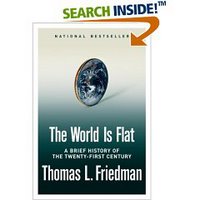 Tom Friedman, a columnist for the New York Times, not at all a conservative fringe writer, said it much better than I in his book "The World is Flat."
Tom Friedman, a columnist for the New York Times, not at all a conservative fringe writer, said it much better than I in his book "The World is Flat."
Here are my points:
- Some companies have learned from years of experience that the hidden cost of management, responsiveness, and the opportunity cost of innovation make off-shoring not worth it, so they're bringing some jobs back. This topic isn't only a labor issues, it's a technology innovation and IP management issue.
America isn't graduating enough baccalaureate level scientists and engineers. 40 years of 'alternative education' exacerbated by 25 years of political correctness, multi-culturalism and other social costs designed to boost egos rather than train scientists and engineers are showing their impact. If we had lots of American-born engineers, our engineering wages would be more competitive with those overseas (supply and demand, remember?).
One of America's highly demanded products is graduate level education. Our graduate level education, especially in science and engineering (including medicine) is un-rivaled in the world. But more and more graduate students are not American-born because American youth would rather be entertainers or lawyers than engineers and doctors. Nothing wrong with that, just that Indians, Koreans, Chinese, Israelis, Egyptians, Russians, Turks... would rather be engineers and doctors.
If we are indeed capitalists and believe in the fairness of the Invisible Hand -- the free market -- then we will see that off-shoring is following a natural economic trend. Just like the argument that illegal Mexican immigrants take the jobs that Americans don't want, at a pay level that Amercians won't accept, off-shoring is a symptom of the exact same thing but in high tech.
Off shoring is not new. The US used to have a steel industry, a textile industry, a ship building industry, a semiconductor fabrication industry, a computer assembly industry... all moved to countries with lower labor costs. Do we miss them? Sure. Has our economy suffered? No. We grew from a manufacturing-based economy to a service-based one -- a knowledge-based economy.
Our best national strategy is not protectionism, unionism, railing at natural economic evolution and the fundamental tenents of capitalism. Our best strategy is to run faster than everyone else on the technology and innovation treadmill -- invent more, commercialize faster, be more ingenius, invest more venture funds, spend more on R&D, sponsor more applied research, help entrepreneurs more in our tax policy, rationalize our intellectual property policy, establish free trade zones, and yes, retrain workers into jobs that have high economic value. We know how to do it and have been doing it for generations. Responsible citizens have the duty to SUPPORT these programs.
We should be happy and grateful that talented people from all over the world want to HELP us by making personal sacrifices to come here and LEARN what we teach, then work here, then take their knowledge home to help their country be richer, to give their people more choices. We should be proud that so many people admire the way we reward talent, hard work and risk taking by trying to be like us, trying to attain our lifestyle.
Instead of complaining about how our former jobs have moved to lower paid people overseas, we should make ourselves suitable for new jobs, jobs that are worth $150,000 in US dollars. Jobs that increase knowledge, improve lives, that eventually will move to other economies. The American torrent of innovation and 'can do' attitude are America's greatest gifts to the world.




No comments:
Post a Comment